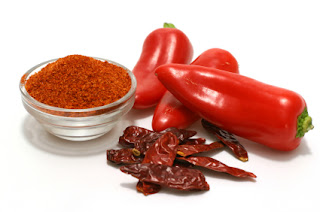Careful With That Cayenne
I have recommended cayenne pepper before. Even though this is a supplement, not all supplements are harmless or harmless in the given amounts. I recommended taking cayenne pepper for circulatory reasons. In that article, it stated that cayenne pepper is THE supplement to have around in case of a heart attack. But as I've always maintained, much of what passes for therapeutic or fix-it advice on the net regarding supplements is sales copy. And nothing sells better than fear or greed. Promise someone they will be richer, better looking, taller, you name it, that's greed--you're selling people what they want and lots of it. Selling fear means you scare people into a position. "If you don't want to lose the value of your IRA, listen to this interview." Same thing with food and with supplements.
So, yes, it's true that cayenne pepper is great for circulation. Absolutely. But do you really need its powerful benefits? I don't know. Only you can answer that. Maybe you could use its benefits for a short time, like in an emergency situation. Or for a few days after that. But remember there are a few organs involved in the circulation of your blood to, through, and from the heart. There are your kidneys for one. There is your heart for two. There is your liver. And your brain sending electronic impulses to everything else.
Gingko Biloba is better tolerated for the long term. That's not an endorsement per se, but Gingko is milder. If I wanted to maintain healthy circulation I'd be running, walking, swimming, hiking, playing basketball or tennis. Find what you like. It may be yoga. Find what you enjoy, find that which brings you that twenty-year-old joy. Could be dancing or any of the other activities I mentioned.
But be careful with cayenne pepper. There are a few important caveats that I want to share with you.
Marie Dannie over at Livestrong reports that
I have recommended cayenne pepper before. Even though this is a supplement, not all supplements are harmless or harmless in the given amounts. I recommended taking cayenne pepper for circulatory reasons. In that article, it stated that cayenne pepper is THE supplement to have around in case of a heart attack. But as I've always maintained, much of what passes for therapeutic or fix-it advice on the net regarding supplements is sales copy. And nothing sells better than fear or greed. Promise someone they will be richer, better looking, taller, you name it, that's greed--you're selling people what they want and lots of it. Selling fear means you scare people into a position. "If you don't want to lose the value of your IRA, listen to this interview." Same thing with food and with supplements.
So, yes, it's true that cayenne pepper is great for circulation. Absolutely. But do you really need its powerful benefits? I don't know. Only you can answer that. Maybe you could use its benefits for a short time, like in an emergency situation. Or for a few days after that. But remember there are a few organs involved in the circulation of your blood to, through, and from the heart. There are your kidneys for one. There is your heart for two. There is your liver. And your brain sending electronic impulses to everything else.
Gingko Biloba is better tolerated for the long term. That's not an endorsement per se, but Gingko is milder. If I wanted to maintain healthy circulation I'd be running, walking, swimming, hiking, playing basketball or tennis. Find what you like. It may be yoga. Find what you enjoy, find that which brings you that twenty-year-old joy. Could be dancing or any of the other activities I mentioned.
But be careful with cayenne pepper. There are a few important caveats that I want to share with you.
Marie Dannie over at Livestrong reports that
Too much capsaicin in food can lead to general symptoms of irritation in the mouth, stomach and intestines, and in some cases, it can cause vomiting or diarrhea. Capsaicin is present in both fresh and dried cayenne, as well as in cayenne powder.A more serious risk is heartburn:
Cayenne pepper in even small amounts, but especially in high quantities, can cause heartburn. The capsaicin content in cayenne irritates the stomach and esophagus lining, increasing the amount of stomach acid produced, which can flow upward into the esophagus, creating a burning sensation in your upper abdomen. A 2010 publication of “Revista de Gastroenterologia de Mexico” found that capsaicin caused gastrointestinal reflux symptoms in people suffering regularly from heartburn as well as those who normally do not experience any reflux problems.Have never experienced this reaction with Ginkgo Biloba. Again from LiveStrong. This time from Joseph Pritchard--not good for your liver or kidneys:
Capsaicin [has] been associated with stomach upset, kidney and liver damage as well as abdominal pain, the University of Maryland Medical Center explains. Capsaicin has been associated with increased stomach acidity as well as lowering the effect of ranitidine and other stomach acid reducers. Capsaicin also potentiates the effects of blood-thinning medications.This is why you need something milder. Perhaps you can find a way to take milder amounts of cayenne pepper. Or simply take Ginkgo Biloba. But don't give up on Cayenne Pepper on my account. Dr. Edward Group points us to "17 Health Benefits of Cayenne Pepper," some of which seem a little contradictory in my view. Check out how Dick Quinn relied on cayenne pepper for heart health.

No comments:
Post a Comment